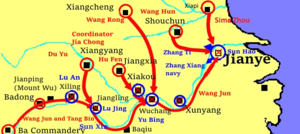
Back سقوط مملكة وو الشرقية Arabic Conquête du Wu par le Jin French Penaklukan Wu oleh Jin ID 呉の滅亡 (三国) Japanese 진의 오 정복 Korean Jins erobring av Wu NB Завоевание царства У империей Цзинь Russian การพิชิตง่อก๊กโดยราชวงศ์จิ้น Thai Chiến tranh Tấn – Ngô (280) Vietnamese 晉滅吳之戰 Chinese
| Conquest of Wu by Jin | |||||||
|---|---|---|---|---|---|---|---|
| Part of the wars of the Three Kingdoms period | |||||||
 A map showing the Jin conquest of Wu | |||||||
| |||||||
| Belligerents | |||||||
| Jin dynasty | Wu | ||||||
| Commanders and leaders | |||||||
|
Jia Chong Wang Jun Du Yu Wang Rong Hu Fen Sima Zhou Wang Hun |
Sun Hao Zhang Ti † | ||||||
| Strength | |||||||
| 200,000[3] | 230,000[4] | ||||||
| Casualties and losses | |||||||
| 15,000[citation needed] | |||||||
| Conquest of Wu by Jin | |||||||
|---|---|---|---|---|---|---|---|
| Traditional Chinese | 晉滅吳之戰 | ||||||
| Simplified Chinese | 晋灭吴之战 | ||||||
| |||||||
| Taikang campaign | |||||||
| Chinese | 太康之役 | ||||||
| |||||||
The conquest of Wu by Jin was a military campaign launched by the Jin dynasty against the state of Wu from late 279 to mid 280 at the end of the Three Kingdoms period of China. The campaign, which started in December 279 or January 280,[a] concluded with complete victory for the Jin dynasty on 1 May 280[b] when the Wu emperor Sun Hao surrendered. After the campaign, the Jin emperor Sima Yan (Emperor Wu) changed the era name of his reign from "Xianning" to "Taikang". Hence, the campaign has also been referred to as the Taikang campaign.[c]
The campaign is significant in pre-1911 Chinese military history as it not only ended the chaos of the Three Kingdoms period and reunified China under the Jin dynasty, but was also the first successful large-scale military operation in Chinese history that involved a massive invasion force crossing the Yangtze. Among other aspects, its multi-directional approach, invasions by both land and water, and the sending of a naval fleet downstream along the Yangtze, have had strong influences on subsequent battles in Chinese military history.
- ^ Zizhi Tongjian 1084, vol. 80: "[咸寧五年]冬,十一月,大舉伐吳"
- ^ Zizhi Tongjian 1084, vol. 81: "[太康元年三月]壬寅, ...是日, ...吳主皓面縛輿櫬,詣軍門降。"
- ^ Cite error: The named reference
Jin grand planwas invoked but never defined (see the help page). - ^ Cite error: The named reference
Wu assetswas invoked but never defined (see the help page). - ^ (夫太康之役,衆未盛乎曩日之師 ...) "Bian Wang Lun" (Part 2).
Cite error: There are <ref group=lower-alpha> tags or {{efn}} templates on this page, but the references will not show without a {{reflist|group=lower-alpha}} template or {{notelist}} template (see the help page).